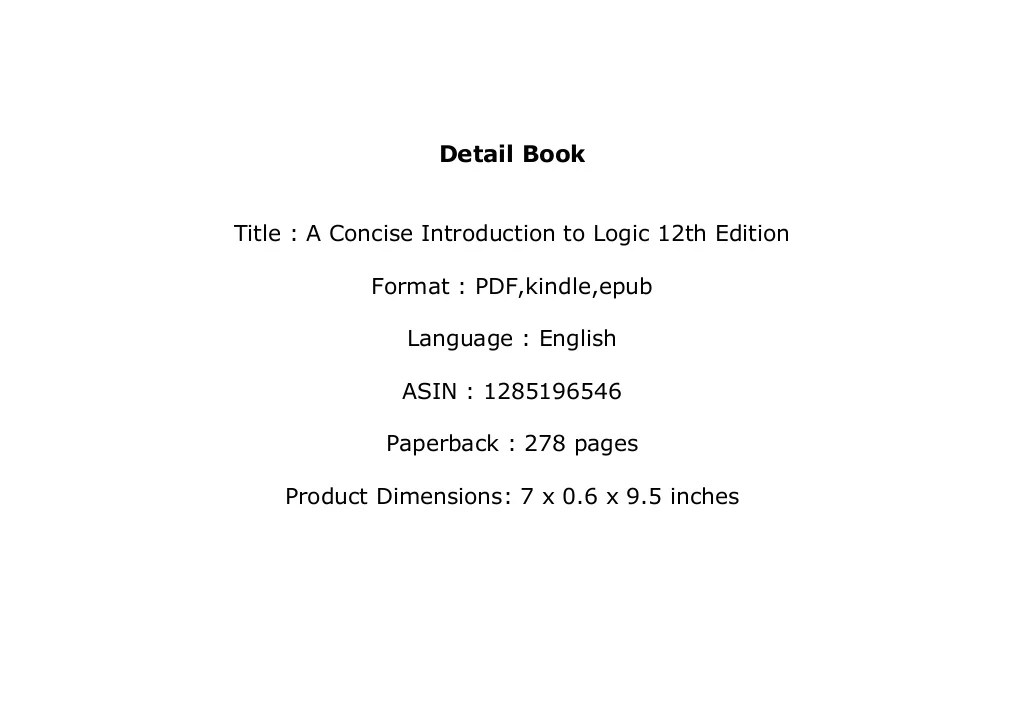A concise introduction to logic 12th edition pdf – A Concise Introduction to Logic, 12th Edition, embarks on an enlightening journey into the captivating world of logic, providing a comprehensive exploration of its fundamental concepts and practical applications.
This meticulously crafted textbook unravels the intricacies of logic, guiding readers through a systematic understanding of propositions, arguments, and fallacies. Delving deeper, it illuminates the syntax and semantics of propositional and predicate logic, empowering individuals to construct and evaluate arguments with precision.
1. Introduction
The 12th edition of “A Concise Introduction to Logic” is a comprehensive and accessible introduction to the fundamental principles of logic. It provides a clear and systematic exposition of the key concepts, methods, and applications of logical reasoning.
The book covers a wide range of topics, including propositional logic, predicate logic, and advanced topics such as modal logic and deontic logic. It also explores the historical development of logic and its applications in various fields, such as mathematics, computer science, and philosophy.
2. Basic Concepts

Logic is the study of reasoning and argumentation. It provides a framework for analyzing and evaluating arguments, identifying fallacies, and constructing valid arguments.
The fundamental concepts of logic include propositions, arguments, and fallacies. Propositions are statements that can be either true or false. Arguments are sets of propositions that support a conclusion. Fallacies are errors in reasoning that can lead to invalid arguments.
Types of Propositions
- Simple propositions: Contain a single subject and predicate.
- Compound propositions: Combine multiple simple propositions using logical connectives (and, or, not, etc.).
- Atomic propositions: Cannot be broken down into simpler propositions.
- Molecular propositions: Can be broken down into simpler propositions.
Types of Fallacies
- Formal fallacies: Errors in the structure or form of an argument.
- Informal fallacies: Errors in the content or reasoning of an argument.
- Fallacy of affirming the consequent: Assuming that the converse of a conditional statement is also true.
- Fallacy of denying the antecedent: Assuming that the inverse of a conditional statement is also true.
3. Propositional Logic
Propositional logic is a formal system that deals with the relationships between propositions. It provides a set of rules for constructing and evaluating arguments involving propositions.
The syntax of propositional logic defines the symbols and rules for constructing well-formed formulas (WFFs). The semantics of propositional logic defines the truth values of WFFs.
Rules of Inference for Propositional Logic, A concise introduction to logic 12th edition pdf
- Modus ponens: If P and P → Q, then Q.
- Modus tollens: If P → Q and not Q, then not P.
- Hypothetical syllogism: If P → Q and Q → R, then P → R.
Truth Tables
Truth tables are a systematic way to evaluate the validity of arguments in propositional logic. A truth table shows all possible combinations of truth values for the propositions involved in an argument and the corresponding truth value of the argument.
4. Predicate Logic: A Concise Introduction To Logic 12th Edition Pdf

Predicate logic is an extension of propositional logic that allows us to make statements about objects and their properties. It provides a more expressive language for representing and reasoning about the world.
The syntax of predicate logic defines the symbols and rules for constructing WFFs. The semantics of predicate logic defines the truth values of WFFs.
Rules of Inference for Predicate Logic
- Universal instantiation: If ∀xPx, then Px[a], where a is any constant.
- Existential generalization: If Px[a], then ∃xPx, where a is any constant.
- Modus ponens: If P(x) and P(a) → Q(a), then Q(a).
5. Applications of Logic
Logic has a wide range of applications in various fields, including mathematics, computer science, and philosophy.
Applications in Mathematics
- Set theory: Logic provides a foundation for set theory, which is essential for mathematics.
- Model theory: Logic is used to study the relationship between mathematical theories and their models.
- Proof theory: Logic provides a framework for studying the structure and validity of mathematical proofs.
Applications in Computer Science
- Database theory: Logic is used to design and query databases.
- Artificial intelligence: Logic is used to represent knowledge and reason about it.
- Programming languages: Logic is used to specify and verify the correctness of programming languages.
Applications in Philosophy
- Epistemology: Logic is used to study the nature of knowledge and belief.
- Metaphysics: Logic is used to study the nature of reality.
- Ethics: Logic is used to study the nature of moral reasoning.
6. Advanced Topics

The 12th edition of “A Concise Introduction to Logic” also covers a range of advanced topics, including modal logic, deontic logic, and inductive logic.
Modal Logic
Modal logic is a system of logic that deals with the concepts of necessity and possibility. It provides a framework for reasoning about what is possible, necessary, and impossible.
Deontic Logic
Deontic logic is a system of logic that deals with the concepts of obligation, permission, and prohibition. It provides a framework for reasoning about what is obligatory, permitted, and forbidden.
Inductive Logic
Inductive logic is a system of logic that deals with the concepts of probability and confirmation. It provides a framework for reasoning about the likelihood of events and the strength of evidence.
7. Historical Context

Logic has a long and rich history, dating back to ancient Greece. The development of logic has been influenced by a number of key philosophers and logicians, including Aristotle, Plato, and Immanuel Kant.
The 12th edition of “A Concise Introduction to Logic” provides a brief history of logic, tracing its development from ancient Greece to the present day.
8. Pedagogical Features
The 12th edition of “A Concise Introduction to Logic” includes a number of pedagogical features to enhance student learning.
These features include:
- Numerous examples and exercises to illustrate the concepts and methods of logic.
- Interactive elements, such as online quizzes and simulations, to engage students and reinforce their understanding.
- A clear and concise writing style that makes the material accessible to students with a variety of backgrounds.
Expert Answers
What are the key features of A Concise Introduction to Logic, 12th Edition?
This edition offers a comprehensive exploration of logic, encompassing fundamental concepts, propositional and predicate logic, applications, advanced topics, and a historical perspective.
How does the book enhance student learning?
It employs a pedagogical approach with numerous examples, exercises, and interactive elements, facilitating a dynamic and engaging learning experience.
What are the practical applications of logic?
Logic finds applications in diverse fields such as mathematics, computer science, philosophy, reasoning, decision-making, and problem-solving.